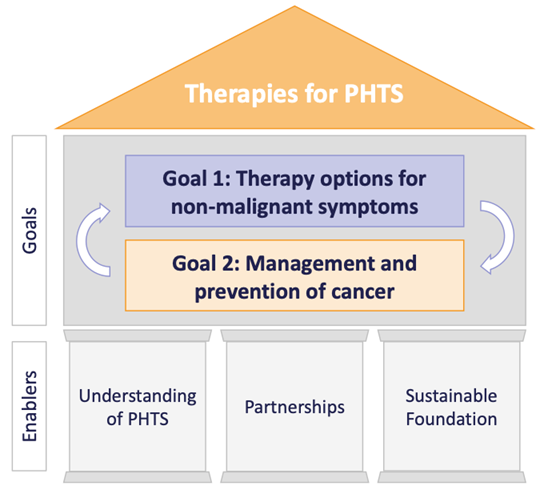Our vision, mission and research strategy
Mission and vision

Research strategy
All PTEN Research funded projects are aligned with our research strategy, which includes short and longer-term goals underpinned by enabling activities.

Research goals
Our central goal is to support the development of therapies for PHTS, with a focus on treatment options for non-malignant symptoms (Goal 1) that are clinically tractable and have a clear unmet need. Our ongoing clinical and pre-clinical work is centred on repurposing existing drugs that target the PI3K/AKT/mTOR signalling pathway. In addition, we are also exploring de novo drug discovery to build a pipeline of future opportunities for clinical development.
As a longer term goal, we are also focussing on improving management and potential prevention of cancer in PHTS (Goal 2), including potential enhancements to cancer surveillance, consideration of 'second hits' in malignant disease, and the identification of potential biomarkers that may ultimately be used to diagnose or monitor for malignant disease.
Enabling the goals
Critical to enable these goals are:
Improved understanding of PHTS: A better understanding of the biology of PTEN and how mutations to the PTEN gene impact the pathobiology of PHTS is critical for guiding our strategy. In addition, we are establishing pre-clinical models of PHTS, creating clinical datasets, and developing clinical outcome measures to support clinical development of potential therapeutics in PHTS.
Partnerships: Effective partnerships with and between the range of organisations and groups required to support the discovery, development, and licensing of potential PHTS therapies. We continue to build strong relationships with leading experts in PHTS and PTEN, rare disease organisations, patients and patient advocacy groups, contract research organisations, regulatory authorities, payers, and pharmaceutical and biotechnology companies.
Sustainable Foundation: In order to progress towards achieving our long-term goals, we undertake careful stewardship of resources and conduct iterative reviews of priorities in light of emerging data. To support the continued work of PTEN Research, we will leverage potential income generation opportunities, such as shared intellectual property, where appropriate, from the research that we fund.
